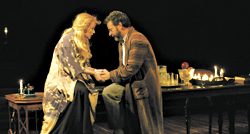That’s right, comic. Sitcomic, even. The tone is a bit startling, even in light of Chekhov’s famous claim that he was a comic writer. The first act isn’t belly-laugh funny, but it’s full of giggles, sharp contemporary turns of phrase, and efficient pratfalls. It blows cobwebs off the language—a rare theatrical experiment that actually succeeds. At points, it’s as if Judd Apatow were channeling the good doctor.
This effect happens particularly thanks to Mark Nelson’s adenoidal, movie-neurotic performance as Vanya, the manager of a decaying rural estate circa 1900. He coulda been a contender! A Schopenhauer! A dashing swain sweeping budding beauties off their feet! But now he’s 50ish, and he’s squandered his life, paying off the estate’s debt and building his brother-in-law’s career for a pittance in pay.
He’s an old nobody in nowheresville, and so is his pompous brother-in-law, Serebriakov (Allen Fitzpatrick)—a once-promising academic who, following the death of Vanya’s sister, has sunk into derivative, irrelevant scholarship. He’s also married to the stunning Elena (played by the stunning movie starlet Samantha Mathis, the last love of the doomed beauty River Phoenix). Woody Allen couldn’t top Nelson’s venomously amusing rants against Serebriakov’s phoniness and parasitism, nor his drunken slapstick lunges at Mathis, who ducks him as deftly as a pro quarterback losing a lunkhead linebacker.
The bits of business aren’t just pasted on, they add up to a character portrait. Vanya is both schlemiel and schlemazel, the waiter who spills the soup and the customer who gets spilled on. If somebody accidentally uses Serebriakov’s footbath to wash his hands, or drinks flower-vase water, it’s going to be Vanya. Sher knows how to sketch with swift, sure strokes: Elena’s erotic effect is conveyed by the come-hither jiggle of a single blond tendril against her elegant black dress (all of Deb Trout’s costumes are elegantly eloquent). Her curl rhymes with the disheveled forelock that flops across her old man’s face at times of crisis, depicting sexless disintegration.
Blessed with girl-next-door glamour, Mathis is highly plausible as a lunge magnet, and she nails the part of a 17-year-old who fell for a famous old guy and now finds herself lonely at 27—her slightly faded yet still luminous star power feeds the part. She’s surprisingly good onstage; she might not do for complex roles, but the simplicity of her gestures is just right here. Her Elena smooches the professor with real passion, but he’s more interested in kvetching about his aching feet. You don’t blame her for falling for the prof’s doctor, Astrov (Tim Hopper), a hunk just past his prime who plants trees and preaches eco-sermons about deforestation. (These used to seem cranky and symbolic—now they make the play all too modern.)
As Vanya’s homely sister Sonya, pining endlessly for Astrov, the not-homely Kristin Flanders captures both the harsh humor and the searing pain of erotic desperation. As the clownish retainer Waffles, Todd Jefferson Moore has the galumphing gestures of Disney’s Goofy, which works. Paula Nelson gives a warm glow of dignity to the servant Nanny. As Vanya’s pro-Serebriakov mom, Lori Larsen is a bit understated in a play that calls for more oomph.
Two niggling reservations prevent my wholehearted endorsement of the comic side of the production: The drunk scenes don’t seem convincingly plastered, and Hopper is a bit wooden as the guy who likes to plant trees. But his rant about the sheer mediocrity of the countryside is almost as funny as Vanya’s.
The trick in doing a comic Vanya is springing the trap shut with a satisfying snap in the second half of the play, when everyone’s delusions come home to roost like vultures. Intiman does a pretty good job of pulling it off. Granted, the spritzy pizzazz of the first part affects the depth of the final descent into sorrow—I’ve come away more heartbroken from Sonya’s unconvincing vow to live to see the whole sky bediamonded and happiness at last. Here, it’s not quite a great heartbreak, but still a moving one. And more interesting than most.
But the gravest danger to this production is in the audience, not among the skillful ensemble onstage. Often, Seattle shows are menaced by what I call the Dumb Smug Chucklers. They seem to want one thing from a play: cute moments they can savor in the shallowest possible way. These people laugh at poignant lines as if they were gag lines; they can’t or won’t respond to complex emotional states. Paradox is lost on them. Really, they are the sort of people Chekhov wrote his plays to shake awake from their bourgeois complacency. They’re loyal customers, and they tempt theaters to cheapen their wares.
The first part of Sher’s Vanya was Dumb Smug Chuckler heaven (though smarter than they realized). Their chuckles in the second, sadder part helped deprive it of its full impact. Theater is an interactive art, and Dumb Smug Chuckles are almost as distracting as ringing cell phones. Leave them home, folks!








